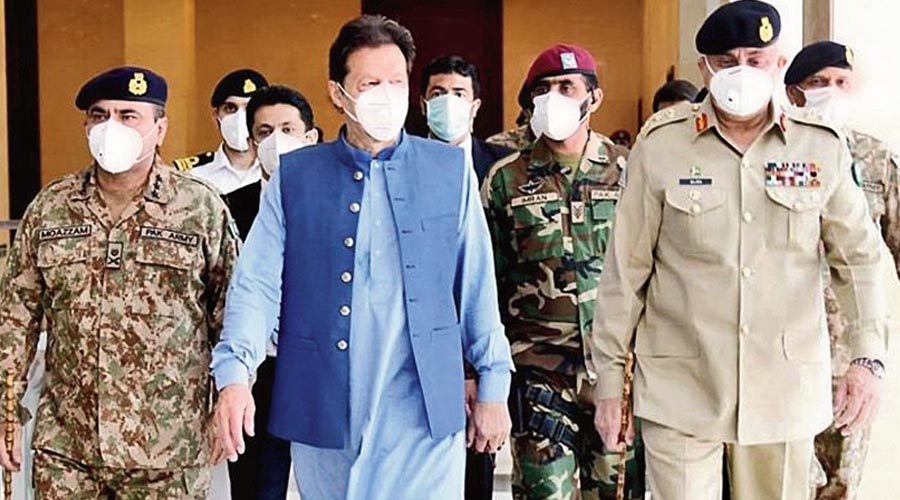The dust is settling after an engrossing climax to almost six weeks of virtually non-stop drama in Pakistan. Even the most fervent optimist would, however, hesitate before suggesting that a stable phase is on the cards with Shehbaz Sharif now installed as prime minister. The general consensus is that an intense turbulence will continue and political feuding will see little quarter asked for or given at least till the elections are over. Perhaps with luck, and depending on the results of the future election, a more stable balance could emerge enabling Pakistan to escape from the breakdown situation for any democracy: when the political class is so divided that politics plays out without virtually any rules.
The latest drama has certainly posed this question with regard to Imran Khan: does he play by any rules? His political strategy is clear enough: its central plank is that an external conspiracy led by the United States of America unseated him and his opponents are foreign agents as well as domestic crooks. His aim now is to use this straightforward one-liner to create such an agitational storm that the elections take place as quickly as possible. His campaigning has, in effect, started and the challenge is to sustain it till the polls. The process is not open-ended since the term of the current National Assembly ends in August 2023. The general expectation is that the elections will take place well before that date, possibly in the first half of 2023. But as they say, a week is a long time in politics and any timeframe being planned now by his opponents can be derailed by his great mastery of agitational techniques. That, at least, is his strategy.
Whether this will yield the dividends expected remains open to speculation. Khan’s core support consists largely of those disenchanted with Pakistan’s patrician political culture led by well-known dynasts with numerous skeletons in their cupboards. What catapulted him to power was, however, not this core constituency but because he appeared to the Pakistan army to be the best available option to dislodge the former prime minister, Nawaz Sharif, and his then ruling Pakistan Muslim League (Nawaz). Since then, things have come full circle. In the past, both the Pakistan Peoples Party and the PML(N) were viewed with suspicion and distrust by the army. Now these two appear more acceptable when compared to Khan.
Yet, if Khan has his portfolio of challenges, so does the former Opposition that is now the ruling alliance. It has inherited formidable problems and an economy bordering on the precarious. Inevitably, the weight of anti-incumbency will grow the longer the new coalition continues in power. Running a credible government with a diverse coalition with numerous internal contradictions, while simultaneously fending off a belligerent opponent who is determinedly mining the anti-Americanism hardwired into many sections of Pakistan society, is a formidable task. In this situation, attention will focus on the role the army plays. With its immediate objective of dislodging a recalcitrant prime minister achieved, will it now revert to a more traditional position of being the final arbiter in the case of political logjams but, otherwise, remaining above the political feuds of the day? Perhaps it will strive to attain this pedestal but the fact that the term of the current army chief ends in November will add an extra element of complexity to the process.
There are numerous theories about internal rifts in the army and how the vicious political feuding underway is the surface symptom of the real contest, which is among the men in uniform. Such speculations surface periodically during times of political crisis in Pakistan. They can never be backed up empirically and, therefore, are difficult to either prove or disprove. They comprise one more addition to the numerous moving parts that make up the puzzle of Pakistan.
The popular narrative about the commanding heights that the Pakistan army occupies obscures how often it finds itself between a rock and a hard place and has also to choose from a menu of, from its point of view, bad options. The central driver is that civil-military contradictions are endemic to Pakistan’s polity. Both sides try to play this down by invoking a ‘same page’ narrative but reality asserts itself from time to time. Thus, other Pakistani prime ministers have also lost their way in the quicksand of the civil-military equation. Khan similarly blundered his way into a minefield and paid the price. But to be clear, it was not just the military that felled him but also his political foes. It is ironic how the trajectory of Sharif’s political career in the 1990s resembles Khan’s meteoric rise and fall in the past decade. It is also ironic that Khan now invokes Zulfikar Ali Bhutto’s ‘assassination’ as an example of how US conspiracies work while simultaneously identifying the Bhutto heirs as being the fifth columnists in league with foreign powers behind his ouster.
What happens to India-Pakistan relations at this conjuncture? The peddling of a foreign conspiracy theory will certainly limit the space for those seeking to move things forward. Khan’s tenure overlapped with a comprehensive decline in bilateral relations, although it is also true that the downswing had begun even before he assumed office. But some positives stand out even in this historically low plateau. The opening of a corridor for pilgrims from India to walk to the Kartarpur Sahib gurdwara is one. The reaffirmation of the LoC ceasefire in February last year is another. That the ceasefire has been working suggests that a small window exists, notwithstanding the current turbulence in Pakistan, for measures to further stabilize the India-Pakistan interface. Whether this window can be used will depend, of course, on how much both governments consciously strive to move beyond the rhetorical and the polemical package that envelops and defines their relations and look at issues of substance.
T.C.A. Raghavan is a former High Commissioner to Pakistan










